Embracing Wholeness
Understanding Our Gifts For Healing Our Broken World
These eight books each explore wholeness from a different perspective: Niles Elliot Goldstein’s Eight Questions of Faith looks to the Bible and to Jewish tradition for guidance and grounding. This turning to faith finds support in Frithjof Schuon’s To Have a Center, in which the preeminent proponent of the Perennial Philosophy advocates for a “religion of the heart” that creates a spiritual environment of beauty and holiness in which to live and grow. Susan Piver’s Start Here Now is an invitation and guidebook to meditation, historically the most powerful path to knowing ourselves and the greater whole of which we are a part. Deepening Engagement moves spirituality into the workplace as Diane M. Millis explores how leadership with a heart might transform the corporate workplace into a “soul-forming” institution. Both Ellen Dugan’s The Natural Psychic and Shannon McRae’s The Healing Effects of Energy Medicine show how we each possess intuitive, healing, or psychic gifts, and offer ways to develop them for our own wholeness and for understanding and healing our broken world. Finally, Loch Kelly, a widely recognized leader in the fields of meditation and psychotherapy, brings us Shift Into Freedom, with its natural, rapid way to make the shift into heart-centered awareness as we go about our daily lives, while Marlise Karlin’s The Simplicity of Stillness Method brings technology into play, making the journey to wholeness easily accessible, even for busy, stressed denizens of the twenty-first century.
Eight Questions of Faith
Biblical Challenges that Guide and Ground Our Lives
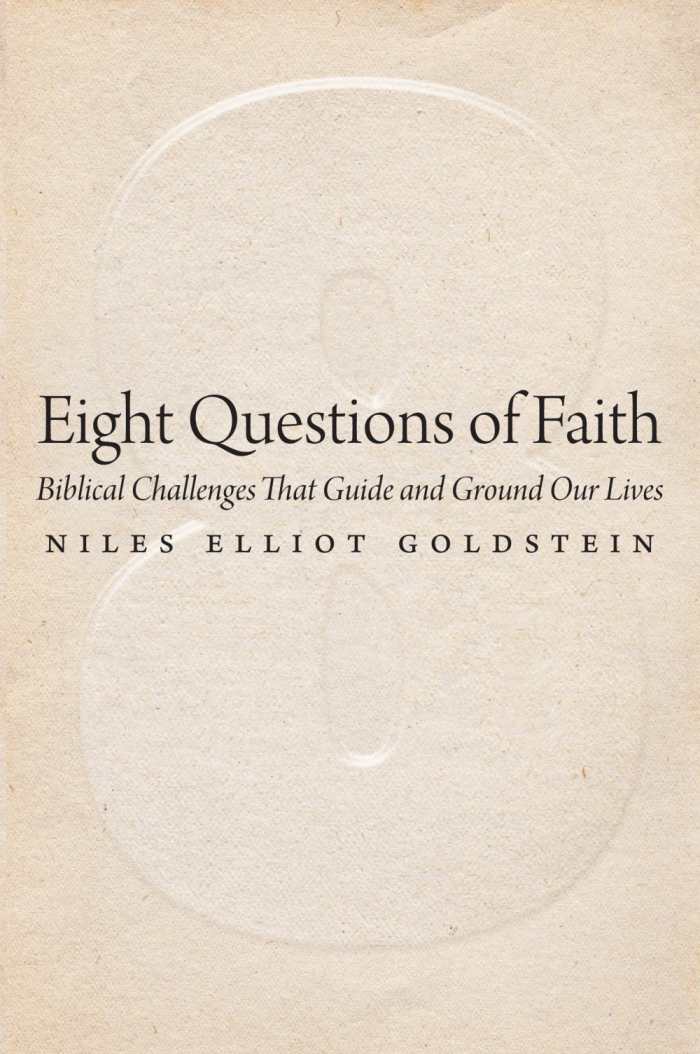
Niles Elliot Goldstein
The Jewish Publication Society
Softcover $19.95 (192pp)
978-0-8276-1219-8
Buy: Local Bookstore (Bookshop), Amazon
Rabbi Niles Elliot Goldstein, the award-winning author or editor of nine books, including Gonzo Judaism, found himself in the midst of a midlife crisis. Questioning his marriage, suffering from burnout in his work as a rabbi, and disillusioned with New York City after nearly twenty years of living and working there, Goldstein sought refuge in a cabin near Hood River, Oregon. There, he personally engaged the life questions that have been asked throughout history: How do we live when we know we are going to die? Why is humility so important? Are we responsible for other people? What is the purpose of human life? Is some knowledge too dangerous to possess? Has God abandoned us? How do we return when we have lost our way? What happens to us after we die? Goldstein’s intimate struggle with these questions forms the basis of his newest book, Eight Questions of Faith: Biblical Challenges that Guide and Ground Our Lives.
Currently the director of development at the Center for Interfaith Engagement and a lecturer at Loyola University, Goldstein calls the Bible “a complex, existential expression of uncertainty and confusion, of yearning and hope, of wonderment, suffering, and joy.” It is, he writes, a “portrait of the valleys and peaks of the human condition” that doesn’t offer rigid answers, but rather graces us with fellowship.
More than a study, Goldstein’s book is a midlife meditation on the imperfections and ambiguities of human life, and the chronicle of a very personal and often painful struggle to attain authenticity and wholeness.
KRISTINE MORRIS (August 27, 2015)
To Have a Center
A New Translation with Selected Letters
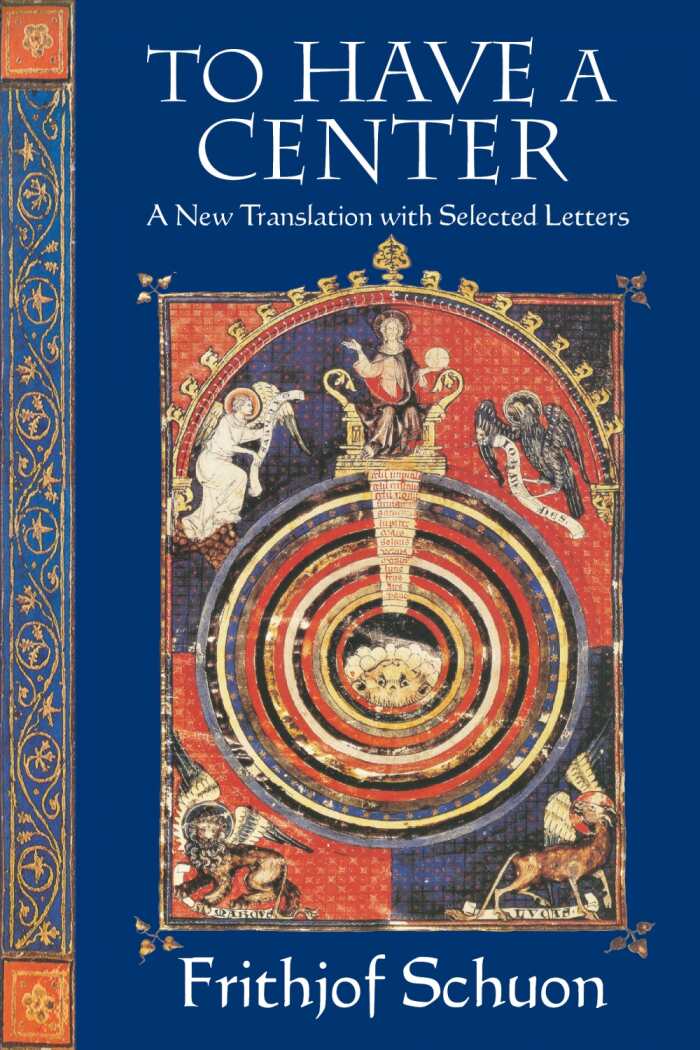
Frithjof Schuon
World Wisdom
Softcover $19.95 (203pp)
978-1-936597-44-4
Buy: Local Bookstore (Bookshop), Amazon
In To Have a Center, Swiss-born philosopher, author, artist, and poet Frithjof Schuon (1907-1998) expresses his faith in an “absolute principle,” or God, and affirms that such faith is the necessary basis for an authentic life. Considered by many to be the preeminent exponent of the Perennial Philosophy, Schuon brings his vast experiential knowledge of world religions to touch on humanity’s need for a coherent, faith-based center from which to navigate a world drowning in relativism and obsessed with the Western cult of “the genius,” which he calls “a phenomenon seeking to compensate for the impoverishment of the modern ambience.”
What he advocates is not a new religion, but the religion of the heart—the truth that underlies all religion; essentially metaphysical, esoteric, and primordial, it is also traditional, and “revealed.” A religion of this type, he affirms, would provide spiritual seekers not only with a metaphysical, doctrinal, and spiritual method, but also with a spiritual environment of beauty and holiness.
During his lifetime, Schuon was initiated into the order of Shaykh Ahmad al-Alawi in Algeria, was taken prisoner by the Germans in WWII, and lived with and studied the sacred traditions of various Native American tribes. He also founded a Sufi order devoted to Mary.
Philosophically, anthropologically, metaphysically, and historically rich, Schuon’s thinking may arouse some contention these days, yet his devotion to all that is best in human character cannot be denied. Unapologetically placing the spiritual at the center of all of human life, he offers light and clarity in dark and confusing times.
KRISTINE MORRIS (August 27, 2015)
Deepening Engagement
Essential Wisdom for Listening and Leading with Purpose, Meaning and Joy
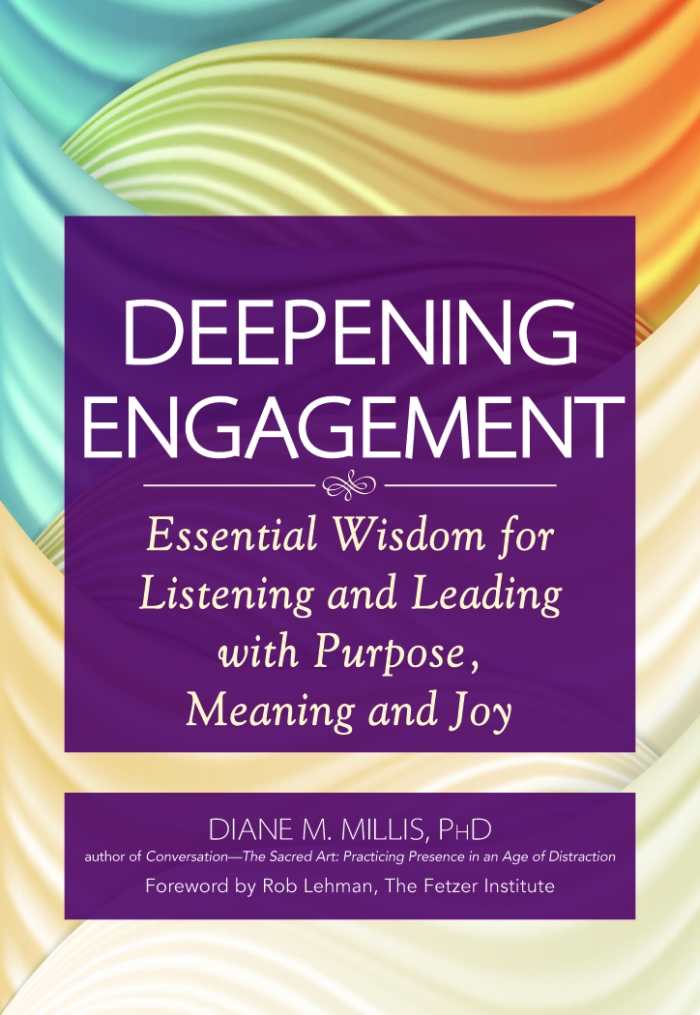
Diane M. Millis
SkyLight Paths Publishing
Softcover $14.99 (149pp)
978-1-59473-584-4
Buy: Local Bookstore (Bookshop), Amazon
Do the corporations and institutions we work for have to be soul killers, or can they actually become “soul-forming” institutions? Leadership consultant, PhD, and coach Diane M. Millis believes that it is possible for those with a call to leadership to make the workplace a source of deepening engagement with our true selves, our colleagues, and the communities we serve. In Deepening Engagement, she offers a tool kit filled with personal stories and guidance from many different wisdom traditions that can meet the needs of all types of leaders, wherever they may be in their spiritual journey. Even those who don’t profess a particular faith will find her invitation to “pause, ponder, and practice” not only practical, but effective.
Challenging and thought-provoking, Millis’s call to listen for “the sound of the genuine” in ourselves and others, ask heart-awakening questions, and be willing to grow and change with the answers we receive can be transformative for all involved. Through stories, poetry, and gentle yet potent teaching, she models what our encounters with others can become as we engage our true selves and encourage others to do the same.
Designed for personal reflection as well as for use in small groups, Deepening Engagement envisions leadership as a “personal quest and calling” that can be a force for change. Turning the presumption of knowing into listening and learning; changing the status quo into curiosity, exploration, synthesis, and innovation; and moving from the top-down imposition of ideas to collaborative, constructive engagement can make the workplace a place in which we can come alive.
KRISTINE MORRIS (August 27, 2015)
Start Here Now
An Open-Hearted Guide to the Path and Practice of Meditation
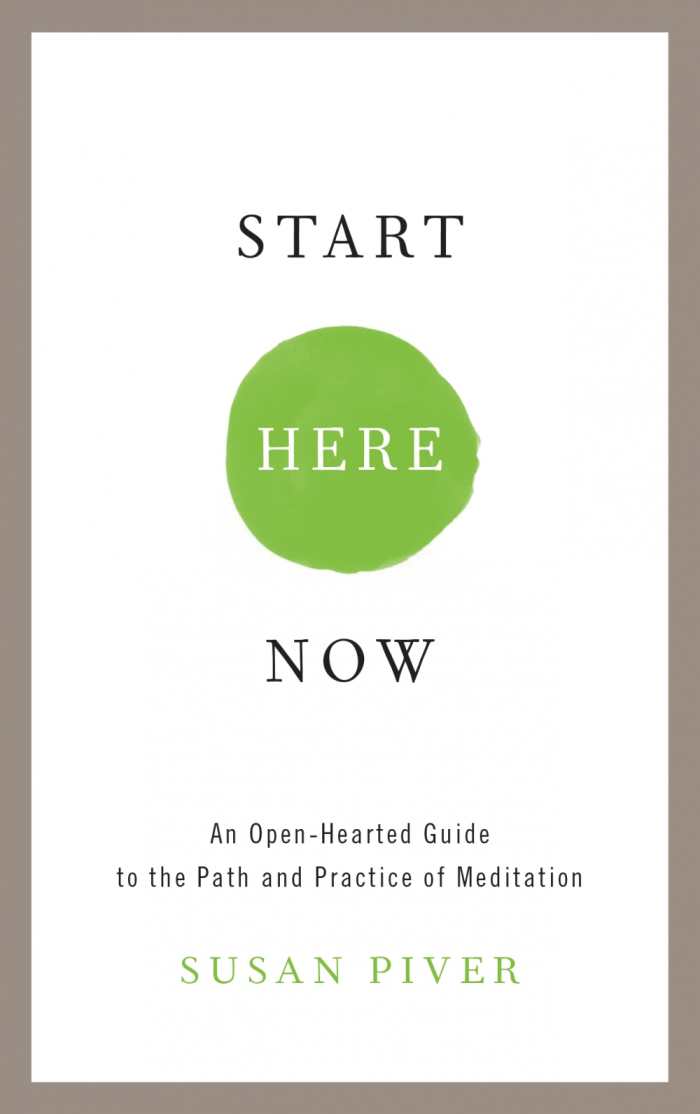
Susan Piver
Shambhala
Softcover $12.00 (192pp)
978-1-61180-267-2
Buy: Local Bookstore (Bookshop), Amazon
Newbies to meditation couldn’t ask for a better guide to the practice than Susan Piver. The best-selling author of many books, including How Not to be Afraid of Your Own Life, The Quiet Mind, and The Hard Questions, has been practicing Buddhist meditation since 1993, took formal Buddhist vows in 1995, and is a trained instructor in the Tibetan Shambhala tradition. She has taught meditation worldwide as well as online through her nondenominational mindfulness community, the Open Heart Project. In Start Here Now, Piver takes a no-nonsense, jargon-free, and totally down-to-earth approach to meditation that offers an understanding of what it really is (a combination of mindfulness and awareness), an overview of its benefits (“if it were a medication, it would be heralded as the miracle drug of the century,” she quotes fellow meditator Jonathan Foust), and all that’s needed to establish a lasting, fulfilling, even life-changing practice.
Those with basic questions on the how-tos of meditation will find answers given with love and understanding. Those who already know the answers but can’t seem to make it to their meditation cushion regularly will find both challenge and encouragement given with a good dose of humor. Piver has also provided resources for those who want to deepen their study, including access to her own online community.
Life doesn’t come with an instruction manual, and even if it did, it’s unlikely that it would work for everyone. But meditation shines a light on the path and gives us a way to access our truest compass: the heart. “It has helped me build a life of joy and meaning,” Piver writes, “and given me ways to cope when joy and meaning seem to disappear.”
KRISTINE MORRIS (August 27, 2015)
The Natural Psychic
Ellen Dugan’s Personal Guide to the Psychic Realm
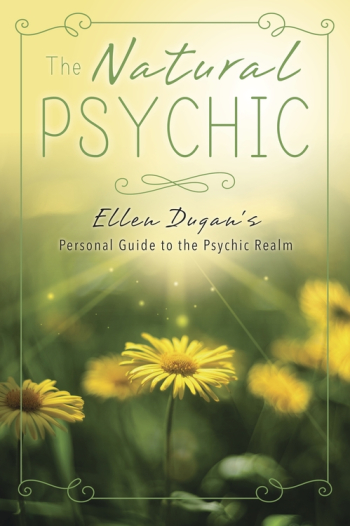
Ellen Dugan
Llewellyn
Softcover $16.99 (216pp)
978-0-7387-4335-6
Buy: Local Bookstore (Bookshop), Amazon
Psychic Ellen Dugan has street cred in abundance: evidence of psychic abilities as a small child, years of study and work to develop her natural skills, and over twenty-five years of doing highly accurate professional psychic readings. In The Natural Psychic, she clarifies the “Three Ps of Psychic Experiences” (premonition, precognition, and postcognition) and offers effective practices for deepening natural psychic gifts and confidently using them to help oneself and others.
Dugan assures the fearful among us that psychic abilities have absolutely nothing to do with religion. They are a natural part of being human, and we all have them to one degree or another. Moreover, she assures us that developing our psychic abilities will be a good thing, though it will take work (homework is provided). Her lively and easy-to-understand descriptions of psychic knowing, hearing, seeing, and feeling make it a cinch to recognize whether we are experiencing clairvoyance, clairaudience, clairsentience, claircognizance, clairtangency, or some combination of these. She also demystifies psychic self-defense, explaining why it’s necessary and how we can protect and nurture our psychic selves.
The Natural Psychic is not a book of theory, nor is it merely a record of one woman’s astounding psychic experiences; rather it’s a workbook designed to help you identify and develop your own particular set of psychic skills and talents and build the confidence to use them to enjoy the fuller, richer, and more exciting life that lies just around the corner.
KRISTINE MORRIS (August 27, 2015)
The Healing Effects of Energy Medicine
Memoirs of a Medical Intuitive
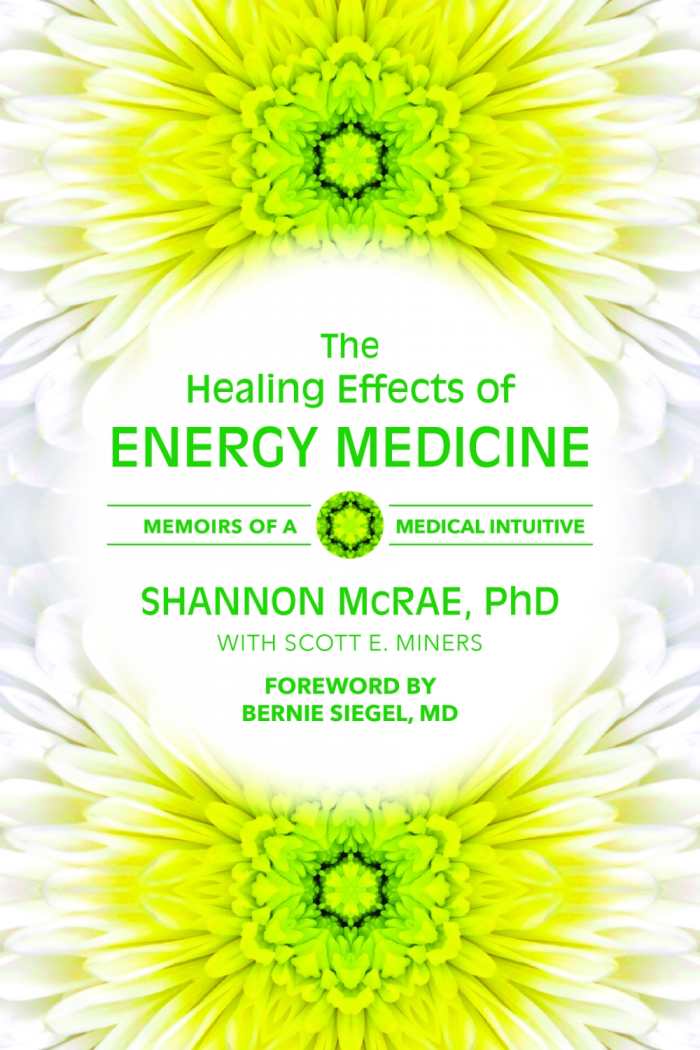
Shannon McRae
Scott E. Miners, contributor
Bernie Siegel, contributor
Quest Books
Softcover $18.95 (208pp)
978-0-8356-0930-2
Buy: Local Bookstore (Bookshop), Amazon
“Everything physical is, at its foundation, made of energy, and energy can be altered through intent,” writes clairvoyant and renowned medical intuitive Shannon McRae. In The Healing Effects of Energy Medicine, McRae, whose work is in the tradition of Therapeutic Touch co-founders Dora Kunz and Dolores Krieger, details the exciting results of current scientific research and recounts stories of her clients as they heal, physically and emotionally, at the cellular level.
“Our minds, thoughts, and feelings—our consciousness—can be seen not only as preeminent, but also as one with the body,” McRae writes. “This means that elements throughout the body, such as hormones and cells in the immune system and brain, are directly linked to one another and affected by consciousness.” Because of this connection, focusing the conscious mind on well-being profoundly affects not only every cell in the body, but our very DNA. “To continually think and feel appreciation is to facilitate an ever-present flow of well-being—which is love—thereby continually bathing the trillions of cells in your body in this flow,” she writes.
McRae describes how emotional pain and resistance to getting well, often buried in the subconscious, can block the body’s natural propensity to heal. She proves how important it is that we learn how to govern our thought life, and how granting forgiveness to ourselves and others is, in itself, a potent force for healing.
Above all, McRae reveals how and why gratitude is such a high-potency healing energy—it turns out that our relationships, and our DNA, thrive best on appreciation.
KRISTINE MORRIS (August 27, 2015)
Shift into Freedom
The Science and Practice of Open-Hearted Awareness
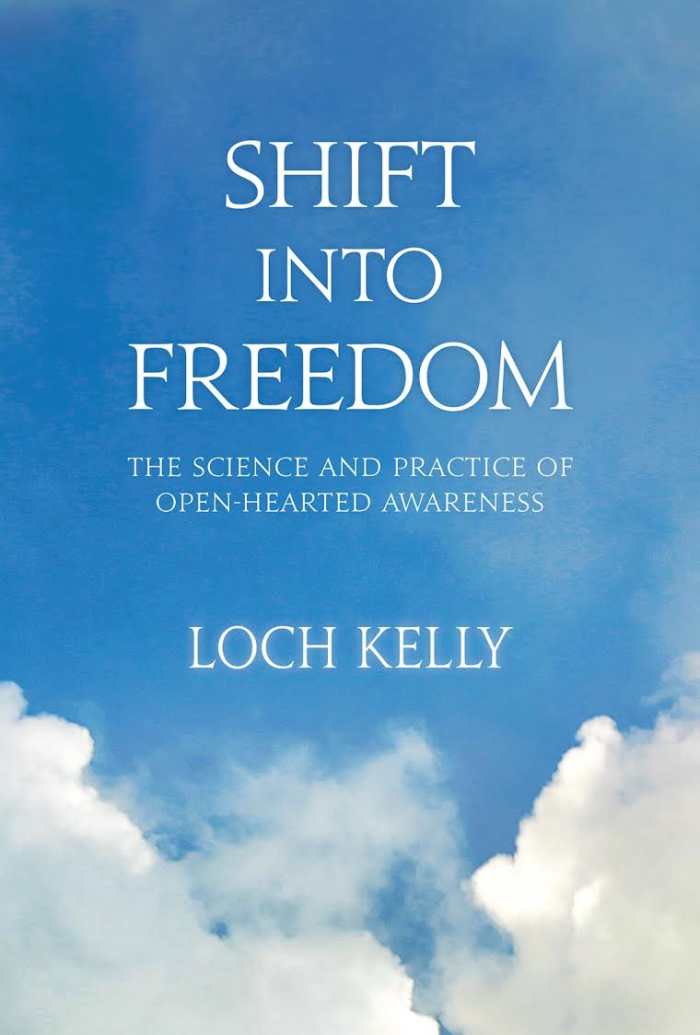
Loch Kelly
Sounds True
Softcover $18.95 (290pp)
978-1-62203-350-8
Buy: Local Bookstore (Bookshop), Amazon
Does spiritual awakening have to be difficult? Does it require years of meditation and tireless struggle to master the mind and body? Loch Kelly, director of the Open-Hearted Awareness Institute and authorized to teach meditation by Tibetan Buddhist teacher Mingyur Rinpoche and American spiritual teacher Adyashanti, answers these questions with a definite “no.” For the past two decades, the psychologist and meditation teacher has been using his innovative synthesis of current neurological research, psychological insights, and ancient wisdom to help people of all backgrounds easily access what he calls “open-hearted awareness”—a state in which we come to fall so in love with our own true nature and its inherent qualities that we stop our incessant seeking in the “spiritual marketplace” and commit to living as our true selves in the awareness that the love we’ve been seeking is who we already are.
How do we do this? By learning how to shift into a different level of mind—one not governed by discursive thought but instead characterized by a spacious stillness. Then, changes will naturally arise in daily life, among them a greater sense of well-being and ease; a recognition of the goodness, pain, and ignorance of the people around us, together with a deepened compassion for them; and the ability to respond, rather than react, to stressful situations.
In Shift into Freedom, Kelly invites us to imagine what the world would be like if more people began to awaken as a normal stage of human development and provides the tools to make this a real possibility.
KRISTINE MORRIS (August 27, 2015)
The Simplicity of Stillness Method
3 Steps to Rewire Your Brain, and Access Your Highest Potential
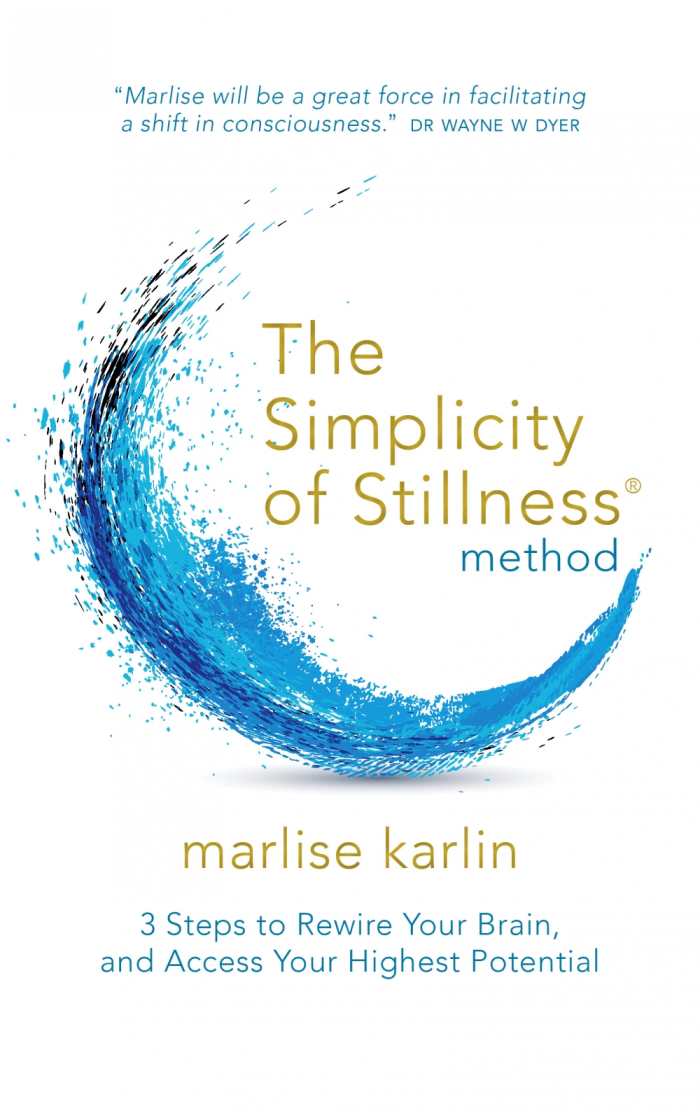
Marlise Karlin
Watkins
Softcover $15.95 (321pp)
978-1-78028-755-3
Buy: Amazon
We’ve been taught that peace of mind and deep self-knowledge can only be accessed through meditation and silencing our thoughts, but many people these days are unable to devote the hours and years needed to become a skilled meditator. Fortunately, new scientific research is revealing ways in which we can achieve the same results much more quickly and efficiently.
Marlise Karlin overcame the effects of childhood abuse and addiction to become an award-winning film producer, author, expert on inner peace, and founder of the Simplicity of Stillness Method. She has shared the stage at global events with Gregg Braden, Dr. Eric Pearl, and others; has been featured on NBC, Fox News, and in many respected publications; is a contributor to the Huffington Post and Mallika Chopra’s intent.com; and is the author of The Power of Peace in You. Her science-based Simplicity of Stillness Method (SOS) combines ancient wisdom and healing traditions from across the globe with groundbreaking energetic tools and technology to meet the needs of our times.
In The Simplicity of Stillness Method, Karlin shares more than a decade of case studies of clients who have used the Stillness Sessions® Technology—relaxing music and words programmed with vibrational frequencies (included in the book)—to recover from anxiety, depression, PTSD, and other illnesses through the activation of advanced meditative states, releasing blocked cellular memory, and naturally rewiring the cells in the body and brain for healing and wholeness.
KRISTINE MORRIS (August 27, 2015)
Kristine Morris is a poet, writer, and former book and media review editor for Spirituality and Health magazine. She is a contributing writer for a regional newspaper, the Grand Traverse Insider, and frequently reviews for Foreword.
Kristine Morris

